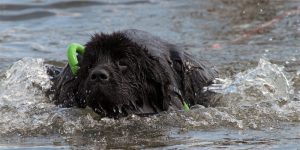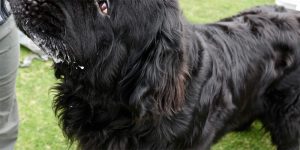The Newfoundland.
In another of our Holidays4Dogs breed articles, we look this time at the splendid Newfoundland Dog – affectionately known as ‘newfies’. Read on to find out more about this handsome and affectionate, giant breed of dog.
For lovers of large breeds of dog, the newfoundland certainly ticks all the boxes! He is imposing in stature; broad and heavy. It is no surprise to learn that, historically, they are reputed to possibly originate from Viking ‘Bear Dogs’. However, there is debate surrounding the true background of the newfoundland dog.
History.
Others consider the origins of this beautiful breed to come from Tibetan mastiffs brought to Canada around the 1700’s. Yet others consider the newfoundland to have close connections with the Labrador retriever. This would certainly be a plausible explanation given the close proximity of the coast of Newfoundland to that of Labrador. Indeed, Labradors were in fact originally known as the, “lesser Newfoundland dog”.
The Newfoundland dog’s purpose in life was for hauling nets, carrying mooring lines to shore and retrieving items from the sea.
Their pursuits included rescuing people from the water too. In 1919, one notable dog was even awarded a medal for pulling a small lifeboat containing twenty people to safety. They were also utilised for pulling small carts delivering of post and supplies to the community.
Skills.
To this day, the newfoundland remains an outstanding water dog. They are often referred to as the St.Bernard of the water, having massive paws and webbed feet which help propel them efficiently through the water.
They are often referred to as the St.Bernard of the water, having massive paws and webbed feet which help propel them efficiently through the water.
In recent years, the Red Cross Flood Response Unit based in Inverness have recruited Loki, a Newfoundland dog to join their team. The response unit is the only one of it’s kind in the UK specialising in water based search and rescue.
There is also a very popular working newfoundland club in the UK who regularly run water trials and tests throughout the year. The idea of the club is to promote and maintain the working ability of newfoundland’s – a task these dogs readily take to and enjoy.
There are many other training clubs for ‘newfies’ across the country. The New Forest Club, in particular, train dogs in water work, but also draught work and carting. The club organises demonstrations throughout the country. For anyone who loves boating and dogs – the Newfoundland must surely fit the bill.
Character.
As pets, Newfoundland’s make outstandingly gentle companions, being very sweet-tempered, intelligent and sociable. They are sometimes renowned for being a little stubborn and even lazy. As such, they require a consistent and positive approach to training.
As such, they require a consistent and positive approach to training.
Socialisation, as with any dog, is very important but since ‘newfies’ are such an enormous breed, they need to learn good manners when amongst people and other animals.
Being large dogs, they need reasonable house space to move around so they are not in the way. However, if owners are happy for things to be ‘cosy’, the newfoundland is usually happy living in more confined quarters.
They are generally very quiet and inactive around the home. However, they may house-proud people as they do tend to have a distinct doggy odour. They also drool quite profusely.
Care and health.
Grooming is an important aspect of caring for the newfoundland. They have very thick, coarse, coats and moult heavily twice a year.
Because they have very oily waterproof coats it’s generally not a good idea to bath with pet shampoo too much, as this strips the coat of oils. However, daily brushing to remove loose hair, dirt and debris, is essential.
As with similar large breeds, it is vital not to over exercise a Newfoundland puppy. As puppies, they do require a good diet and quantities will be large. However, once fully grown they will generally consume around the same amount as an adult Labrador.
Vets bills tend to be higher for larger breeds of dog. In addition, the cost of equipment such as crates, collars, leads and harnesses will be more expensive. Indeed, they can be an expensive breed to purchase in the first instance.
Unfortunately, newfoundland’s do suffer from hereditary heart disease called subaortic stenosis (SAS). They are also prone to Hip-dysplasia, so it is always wise to check the breeder has carried out health screening.


